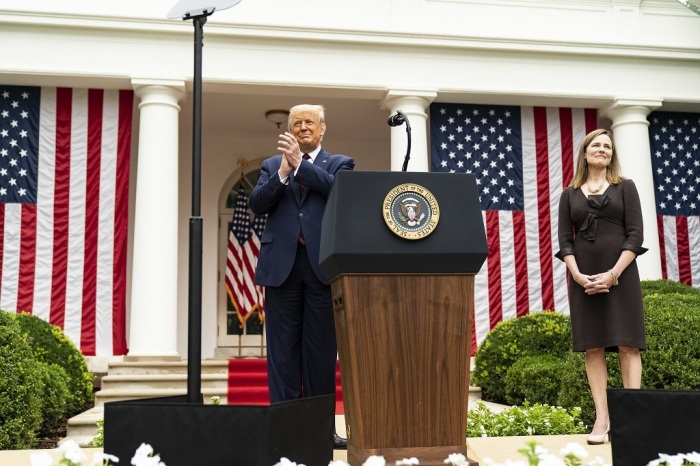62% say judicial nominees shouldn't be questioned about religious beliefs: poll

On the eve of Amy Coney Barrett’s confirmation hearing, a new survey was released showing that about two-thirds of Americans believe that judicial nominees should not be questioned about their religious beliefs during confirmation hearings.
On Sunday, the day before the start of Barrett’s nomination hearings, the conservative legal group First Liberty Institute released the results of a new poll conducted by Mason-Dixon Polling & Strategy.
The firm interviewed 1,000 registered voters nationwide via telephone from Oct. 5 through Oct. 7. Respondents were asked the question: “Do you think judicial nominees should or should not be questioned about their religious beliefs as part of the confirmation process?”
With a margin of error of plus or minus 3.2 percentage points, 62% of respondents said that nominees “should not” be questioned about their religious beliefs. Meanwhile, 30% of respondents answered that nominees “should” face questioning about their religious beliefs. About 8% answered that they were “not sure.”
The question comes as there has been a pattern of Democratic senators questioning the religious beliefs of Trump nominees related to LGBT issues and abortion.
Barrett, who was nominated last month to replace the late Justice Ruth Bader Ginsburg on the nation’s highest court, has already been the focus of media reports about her association with a Christian school in Indiana that upholds the biblical definition of marriage.
Barrett also faced questioning about her faith when she was nominated in 2017 to the U.S. Court of Appeals for the 7th Circuit.
“In nearly every other employment context, asking questions concerning an applicant’s religious beliefs would be an employment law violation,” First Liberty CEO Kelly Shackelford wrote in a letter sent to Senate Judiciary Committee Chairman Lindsey Graham, R-S.C., on Sunday sharing the results of the survey.
“We believe such questions not only go beyond the nation’s rich tradition of religious tolerance, they violate the ‘no religious test for office’ provision of Article VI of the U.S. Constitution.”
Broken down by party line, 44% of Democrats said that judicial nominees should be questioned about their religious beliefs as part of the confirmation process, while 45% of Democrats said that religious beliefs should not be questioned.
As for Republicans, only 9% said religious beliefs should be questioned during the judicial confirmation process and 85% of Republican respondents said they should not be questioned.
At 43%, young people (ages 18 through 34) were the most likely of any voting-aged age bracket to believe that judicial nominees should be questioned about their faith.
Among racial demographics, black respondents (39%) were the most likely to say that nominees should be questioned about their religious beliefs, while 28% of white respondents and 29% of Hispanic respondents said the same thing.
Among those who don’t believe Barrett should be questioned about her conservative religious beliefs is Rev. Rob Schenck, an evangelical pastor and prominent critic of President Donald Trump who has in the past identified himself as a former “Anti-Abortion Crusader” turned supporter of Roe v. Wade.
“One word of warning to the Democrats who will use their constitutional and Senate rule-based power to try to thwart President Trump’s nominee from being seated: Evangelicals like me, and the even more numerous Catholics who have tentatively moved into the Democratic column because of Mr. Trump’s massive failings, will be watching to be sure Judge Barrett’s religious beliefs are not placed on trial this week,” Schenck wrote in a recent op-ed shared with The Christian Post. “U.S. Senators should need no reminding that the Constitution prohibits a religious test for office.”
Schenck, president of The Dietrich Bonhoeffer Institute in Washington, D.C., argued that bringing Barrett’s religious beliefs and practices “into question in a political tribunal would send the wrong message to a wave of religious conservatives who have decided to vote — perhaps just this once — for a Democrat.”
“While I don’t believe most Democratic senators hold any prejudice against people of faith, questioning or skepticism about Judge Barrett’s religious background would give content producers at Fox News, Breitbart News Network, and many other conservative platforms just the material they need to scare away many new religiously-motivated crossover voters,” he argued.
“During this week’s U.S. Supreme Court confirmation hearings, Democratic senators must stay away from religion entirely and focus on Judge Barret’s record, her judicial philosophy, competency, and temperament. Only by doing so can Democrats retain their new supporters and remain, well, ‘above reproach.’”
Vice President Mike Pence brought up the Democrats’ previous questioning of religious beliefs of Trump nominees during the vice presidential debate last Wednesday. He slammed Democratic vice presidential nominee Kamala Harris’ previous questioning of Trump judicial nominee Brian C. Buescher’s affiliation with the Catholic fraternal organization Knights of Columbus in 2018.
“We particularly hope that we don’t see the kind of attacks on [Barrett’s] Christian faith that we saw before,” Pence said. “The Democrat chairman of the Judiciary Committee before, when Judge Barrett was being confirmed for the Court of Appeals, expressed concern that the ‘dogma of her faith lived loudly in her.’ Dick Durbin of Illinois said it was a concern."




























